
-
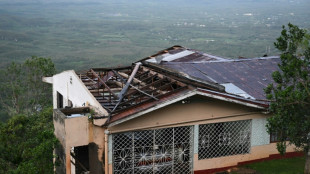 'Nowhere to sleep': Melissa upends life for Jamaicans
'Nowhere to sleep': Melissa upends life for Jamaicans
-
Irish octogenarian enjoys new lease on life making harps
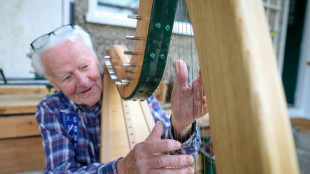
-
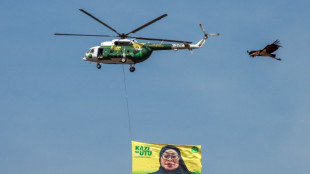 Tanzania blackout after election chaos, deaths feared
Tanzania blackout after election chaos, deaths feared
-
G7 meets on countering China's critical mineral dominance

-
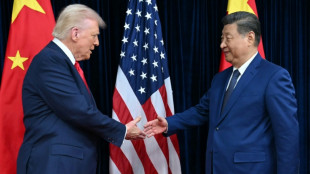 Trump hails tariff, rare earth deal with Xi
Trump hails tariff, rare earth deal with Xi
-
Court rules against K-pop group NewJeans in label dispute

-
 India's Iyer says 'getting better by the day' after lacerated spleen
India's Iyer says 'getting better by the day' after lacerated spleen
-
Yesavage fairytale carries Blue Jays to World Series brink

-
 Bank of Japan keeps interest rates unchanged
Bank of Japan keeps interest rates unchanged
-
Impoverished Filipinos forge a life among the tombstones

-
 Jokic posts fourth straight triple-double as Nuggets rout Pelicans
Jokic posts fourth straight triple-double as Nuggets rout Pelicans
-
UN calls for end to Sudan siege after mass hospital killings

-
 Teenage Australian cricketer dies after being hit by ball
Teenage Australian cricketer dies after being hit by ball
-
As Russia advances on Kupiansk, Ukrainians fear second occupation

-
 Trade truce in balance as Trump meets 'tough negotiator' Xi
Trade truce in balance as Trump meets 'tough negotiator' Xi
-
China to send youngest astronaut, mice on space mission this week

-
 Yesavage gem carries Blue Jays to brink of World Series as Dodgers downed
Yesavage gem carries Blue Jays to brink of World Series as Dodgers downed
-
With inflation under control, ECB to hold rates steady again

-
 Asia stocks muted with all eyes on Trump-Xi meeting
Asia stocks muted with all eyes on Trump-Xi meeting
-
Personal tipping points: Four people share their climate journeys

-
 Moto3 rider Dettwiler 'no longer critical' after crash: family
Moto3 rider Dettwiler 'no longer critical' after crash: family
-
US economy in the dark as government shutdown cuts off crucial data

-
 Trump orders nuclear testing resumption ahead of Xi talks
Trump orders nuclear testing resumption ahead of Xi talks
-
'Utter madness': NZ farmers agree dairy sale to French group

-
 Samsung posts 32% profit rise on-year in third quarter
Samsung posts 32% profit rise on-year in third quarter
-
30 years after cliffhanger vote, Quebec separatists voice hope for independence

-
 Taxes, labor laws, pensions: what Milei wants to do next
Taxes, labor laws, pensions: what Milei wants to do next
-
South Sudan's blind football team dreams of Paralympic glory

-
 US says 4 killed in new strike on alleged Pacific drug boat
US says 4 killed in new strike on alleged Pacific drug boat
-
What we do and don't know about Rio's deadly police raid

-
 'They slit my son's throat' says mother of teen killed in Rio police raid
'They slit my son's throat' says mother of teen killed in Rio police raid
-
Arteta hails 'special' Dowman after 15-year-old makes historic Arsenal start

-
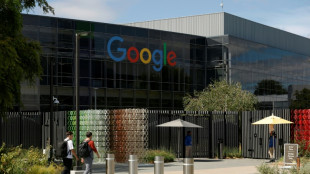 Google parent Alphabet posts first $100 bn quarter as AI fuels growth
Google parent Alphabet posts first $100 bn quarter as AI fuels growth
-
Underwater 'human habitat' aims to allow researchers to make weeklong dives

-
 Maresca slams Delap for 'stupid' red card in Chelsea win at Wolves
Maresca slams Delap for 'stupid' red card in Chelsea win at Wolves
-
'Non-interventionist' Trump flexes muscles in Latin America

-
 Slot defends League Cup selection despite not meeting 'Liverpool standards'
Slot defends League Cup selection despite not meeting 'Liverpool standards'
-
'Poor' PSG retain Ligue 1 lead despite stalemate and Doue injury

-
 Kane nets twice in German Cup as Bayern set European wins record
Kane nets twice in German Cup as Bayern set European wins record
-
Liverpool crisis mounts after League Cup exit against Palace

-
 Juve bounce back after Tudor sacking as Roma, Inter keep pace with leaders Napoli
Juve bounce back after Tudor sacking as Roma, Inter keep pace with leaders Napoli
-
Kane scores twice as Bayern set European wins record

-
 Radio Free Asia suspends operations after Trump cuts and shutdown
Radio Free Asia suspends operations after Trump cuts and shutdown
-
Meta shares sink as $16 bn US tax charge tanks profit
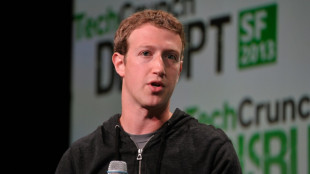
-
 Dollar rises after Fed chair says December rate cut not a given
Dollar rises after Fed chair says December rate cut not a given
-
Google parent Alphabet posts first $100 bn quarter as AI drives growth

-
 Rob Jetten: ex-athlete setting the pace in Dutch politics
Rob Jetten: ex-athlete setting the pace in Dutch politics
-
Juve bounce back after Tudor sacking as Roma keep pace with leaders Napoli

-
 Favorite Sovereignty scratched from Breeders' Cup Classic after fever
Favorite Sovereignty scratched from Breeders' Cup Classic after fever
-
Doue injured as PSG held at Lorient in Ligue 1


Start ups bringing Pakistan's farming into digital age
Agriculture entrepreneurs are bringing the digital age to Pakistan's farmers, helping them plan crops better and distribute their produce when the time is right.
Until recently, "the most modern machine we had was the tractor", Aamer Hayat Bhandara, a farmer and local councillor behind one such project told AFP in "Chak 26", a village in the agricultural heartland of Punjab province.
Even making mobile phone calls can be difficult in many parts of Pakistan, but since October, farmers in Chak 26 and pilot projects elsewhere have been given free access to the internet -- and it is revolutionising the way they work.
Agriculture is the mainstay of Pakistan's economy, accounting for nearly 20 percent of gross domestic product and around 40 percent of the workforce.
It is estimated to be the world's fifth-largest producer of sugarcane, seventh-largest of wheat and tenth-biggest rice grower -- but it mostly relies on human labour and lags other big farming nations on mechanisation.
Cows and donkeys rest near a muddy road leading to a pavilion in Chak 26, which is connected to a network via a small satellite dish.
This is the "Digital Dera" -- or meeting place -- and six local farmers have come to see the computers and tablets that provide accurate weather forecasts, as well as the latest market prices and farming tips.
"I've never seen a tablet before," said Munir Ahmed, 45, who grows maize, potatoes and wheat.
"Before, we relied on the experience of our ancestors or our own, but it wasn't very accurate," added Amjad Nasir, another farmer, who hopes the project "will bring more prosperity".
- Apps and apples -
Communal internet access is not Bhandara's only innovation.
A short drive away, on the wall of a shed, a modern electronic switch system is linked to an old water pump.
A tablet is now all he needs to control the irrigation on part of the 100 hectares (250 acres) he cultivates -- although it is still subject to the vagaries of Pakistan's intermittent power supply.
This year, Bhandara hopes, others will install the technology he says will reduce water consumption and labour.
"Digitising agriculture... and the rural population is the only way to prosper," he told AFP.
At the other end of the supply chain, around 150 kilometres (90 miles) away in Lahore, dozens of men load fruit and vegetables onto delivery bikes at a warehouse belonging to the start-up Tazah, which acts as an intermediary between farmers and traders.
After just four months in operation, the company delivers about 100 tonnes of produce every day to merchants in Lahore and Karachi who place orders via a mobile app.
"Before, the merchant had to get up at 5 am or 5:30 am to buy the products in bulk, at the day's price, and then hassle with transporting them," said Inam Ulhaq, regional manager.
"Tazah brings some order to the madness."
In the Tazah office, several employees manage the orders, but for the time being, purchases are still made by phone, as the part of the application intended for farmers is still in development.
The young company is also tackling a "centuries-old" system that stakeholders are reluctant to change, explains co-founder Abrar Bajwa.
- Record investment -
Fruit and vegetables often rot during their journey along poorly organised supply chains, says partner Mohsin Zaka, but apps like Tazah make the whole system more efficient.
In addition to Lahore, Tazah is already operating in the largest city, Karachi, and is preparing to move into the capital, Islamabad.
A $20 million fundraising campaign is underway, the co-founder told AFP, at a time when investments are pouring into Pakistani start-ups.
Foreign investment in Pakistan startups exceeded $310 million last year -- five times the 2020 level and more than the previous six years combined, according to several reports.
Further down the chain, Airlift -- which provides grocery deliveries -- raised $85 million in a record-breaking prospectus for the country in August.
"A lot of the markets that venture investors are looking for, like India or Indonesia, are saturated," said Bajwa, a former director at Careem, the local ride-hailing app acquired by Uber in 2020.
Now Pakistan, the world's fifth-most populous country, is attracting attention and agriculture is a sector that is "completely untapped from a technological point of view", he said.
It is "certainly the one where we can have the biggest impact" here, he noted.
K.AbuDahab--SF-PST
